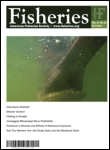
FISHERIES
Scope & Guideline
Connecting knowledge for a sustainable aquatic future.
Introduction
Aims and Scopes
- Fisheries Management and Policy:
The journal focuses on the development and evaluation of fisheries management strategies and policies, emphasizing evidence-based approaches to enhance sustainability and governance. - Ecological and Environmental Research:
Research articles explore ecological dynamics and environmental factors affecting fish populations, habitat health, and ecosystem interactions, contributing to a comprehensive understanding of aquatic ecosystems. - Conservation and Restoration Efforts:
A consistent theme is the examination of conservation practices and restoration efforts aimed at preserving fish species and their habitats, often integrating community involvement and indigenous knowledge. - Technological Innovations in Fisheries Science:
The journal highlights advancements in technology for fish monitoring, data collection, and management, fostering the integration of innovative tools in fisheries research. - Social Dimensions of Fisheries:
The inclusion of social science perspectives allows for exploration of human dimensions, including recreational fishing, community engagement, and the socio-economic impacts of fisheries.
Trending and Emerging
- Climate Change Impacts on Fisheries:
There is an increasing emphasis on understanding the effects of climate change on fish populations and ecosystems, reflecting the urgent need for adaptation strategies in fisheries management. - Diversity, Equity, and Inclusion (DEI) in Fisheries:
Research addressing DEI in fisheries science is gaining prominence, highlighting the importance of diverse perspectives and equitable practices within the fisheries community. - Community and Citizen Science Engagement:
The journal shows a growing trend towards involving local communities and citizen scientists in data collection and fisheries management, enhancing public participation and knowledge co-production. - Interdisciplinary Approaches to Fisheries Science:
Emerging studies often adopt interdisciplinary frameworks, integrating social, ecological, and technological dimensions to address complex fisheries issues more holistically. - Innovative Monitoring Technologies:
There is an increasing focus on the application of new technologies, such as environmental DNA (eDNA) and remote sensing, to improve fish monitoring and management practices.
Declining or Waning
- Traditional Fisheries Practices:
There appears to be a decrease in research focused solely on traditional fishing practices, as the journal increasingly emphasizes modern management approaches and ecological sustainability. - Single-Species Management Approaches:
Research centered on single-species management is becoming less frequent, reflecting a shift towards ecosystem-based management that considers multi-species interactions and broader ecological contexts. - Generalized Fish Biology Studies:
Studies that provide generalized accounts of fish biology, without specific application to management or conservation, are declining as the journal seeks to publish more targeted, impactful research.
Similar Journals
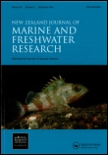
NEW ZEALAND JOURNAL OF MARINE AND FRESHWATER RESEARCH
Diving Deep into the Science of Aquatic EnvironmentsNEW ZEALAND JOURNAL OF MARINE AND FRESHWATER RESEARCH, published by Taylor & Francis Ltd, stands as a distinguished platform for the dissemination of innovative research in the realms of aquatic science and ecology. With an ISSN of 0028-8330 and E-ISSN 1175-8805, this journal has been curating significant scientific contributions since its inception in 1967, continuing through to 2024. Recognized in the Q2 category across multiple relevant fields—including Aquatic Science, Ecology, and Water Science—this journal ranks notably in Scopus, with a 74th percentile for Ecology, Evolution, Behavior and Systematics, highlighting its impact and relevance within the scientific community. Though not an open-access publication, its rigorous peer-reviewed articles offer insights that resonate with researchers, professionals, and students who are passionate about advancing our understanding of freshwater and marine ecosystems. By fostering a collaborative space for ecological and environmental inquiries, the NEW ZEALAND JOURNAL OF MARINE AND FRESHWATER RESEARCH is essential for those aiming to contribute to the vital conversations around biodiversity, conservation, and sustainable management of aquatic resources.

AFRICAN JOURNAL OF MARINE SCIENCE
Fostering collaboration for a healthier marine environment.AFRICAN JOURNAL OF MARINE SCIENCE is a premier academic journal dedicated to advancing the field of aquatic sciences and ecological studies, published by Taylor & Francis Ltd. Established in 2003 and based in South Africa, this journal provides a vital platform for researchers, professionals, and students interested in the diverse and dynamic marine ecosystems of Africa. With an impressive impact factor reflected in its Q2 quartile ranking in both Aquatic Science and Ecology, Evolution, Behavior and Systematics categories, the journal showcases innovative research that addresses pressing environmental challenges. Open access options facilitate broad dissemination of knowledge, ensuring that cutting-edge findings are accessible to all stakeholders in the marine research community. As it converges towards its impressive milestone year of 2024, the AFRICAN JOURNAL OF MARINE SCIENCE serves as an essential resource for fostering scientific discourse and collaboration across the continent and beyond.

FISHERY TECHNOLOGY
Elevating standards in fisheries research and technology.FISHERY TECHNOLOGY is a distinguished journal dedicated to the advancement of knowledge in the field of fisheries science and technology. Published by the Society of Fisheries Technologists, India, this journal serves as a vital platform for researchers, professionals, and students across the globe to disseminate innovative findings and methodologies related to fishery practices, aquatic ecosystem management, and sustainable fishing technologies. With its ISSN 0015-3001, FISHERY TECHNOLOGY seeks to uphold the standards of scholarly research and contributes significantly to the discourse surrounding marine resources and their sustainable utilization. Although currently not available in an open-access format, the journal remains committed to reaching a wide audience through reputable distribution channels. The journal is characterized by its goal to bridge theoretical research with practical applications, thereby impacting both the scientific community and the fishing industry. Engage with FISHERY TECHNOLOGY to keep abreast of the latest developments and contribute to the sustainable management of aquatic resources.
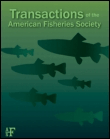
TRANSACTIONS OF THE AMERICAN FISHERIES SOCIETY
Exploring the depths of aquatic ecology and management.TRANSACTIONS OF THE AMERICAN FISHERIES SOCIETY, published by Wiley, is a leading journal dedicated to the field of fisheries science and aquatic ecology, with a rich history dating back to its inception in 1872. As an esteemed publication within the realms of Aquatic Science and Ecology, Evolution, Behavior, and Systematics, it currently holds a Q2 quartile ranking, demonstrating its significance and influence in these disciplines. The journal is not open access, which enables a curated peer-review process while ensuring high-quality research dissemination. The journal serves as a vital platform for scholars and practitioners alike, providing essential insights into the management and conservation of aquatic resources. Its commitment to addressing contemporary challenges faced in fisheries and aquatic environments makes it indispensable for researchers, professionals, and students seeking to contribute to this dynamic field.
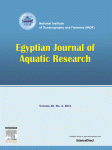
Egyptian Journal of Aquatic Research
Exploring the depths of aquatic ecology and evolution.Welcome to the Egyptian Journal of Aquatic Research, a premier peer-reviewed academic journal published by ELSEVIER, dedicated to advancing the field of aquatic sciences. With a robust impact factor and recognition as a Q1 journal in key categories such as Aquatic Science and Ecology, this open access journal has established itself as a vital platform for disseminating high-quality research since its inception in 2012. The journal aims to provide comprehensive coverage of topics including ecology, evolutionary biology, and water science, making it a crucial resource for researchers, professionals, and students engaged in these dynamic fields. With Scopus rankings placing it in the top echelons of various categories, the Egyptian Journal of Aquatic Research fosters innovation, collaboration, and knowledge dissemination on a global scale, making it an indispensable asset for anyone invested in understanding and preserving aquatic systems.
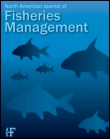
NORTH AMERICAN JOURNAL OF FISHERIES MANAGEMENT
Driving Ecological Insights for Sustainable FisheriesNORTH AMERICAN JOURNAL OF FISHERIES MANAGEMENT, published by WILEY, is a premier peer-reviewed journal dedicated to advancing the science and management of freshwater and marine fisheries across North America. With an ISSN of 0275-5947 and E-ISSN of 1548-8675, this esteemed journal has been a crucial platform for innovative research from its inception in 1981 through to its anticipated evolution in 2024. The journal is recognized for its rigorous scholarship, evidenced by its impact in various categories with a Q2 ranking in Aquatic Science, Ecology, and Ecology, Evolution, Behavior and Systematics, as well as a Q3 ranking in the domain of Management, Monitoring, Policy and Law. Researchers and practitioners can access cutting-edge findings that address critical environmental challenges and promote sustainable fisheries management. With a consistent focus on ecological implications and policy development, this journal serves as an essential resource for those aiming to make a significant impact in fisheries science and management.
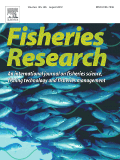
FISHERIES RESEARCH
Pioneering research in fish population dynamics.Fisheries Research, published by Elsevier, is a leading international journal dedicated to the advancement and dissemination of research in the field of aquatic science. With an ISSN of 0165-7836 and E-ISSN 1872-6763, this influential journal has been pivotal in shaping fisheries management and conservation strategies since its inception in 1981. As a distinguished publication ranked in the Q1 category for Aquatic Science in 2023, it holds a prestigious position, reflected in its Scopus ranking of 73/247 in Agricultural and Biological Sciences. Fisher fisheries research encompasses a diverse array of topics such as fish population dynamics, ecosystem management, and sustainable practices, making it an essential resource for researchers, professionals, and students alike. Although it currently does not offer Open Access, the journal remains a crucial platform for disseminating high-quality research and fostering dialogue within the aquatic science community. With its address at Radarweg 29, 1043 NX Amsterdam, Netherlands, Fisheries Research continues to contribute significantly to the global discourse on fisheries science and management.

REVIEWS IN FISH BIOLOGY AND FISHERIES
Fostering innovation in aquatic research since 1991.Reviews in Fish Biology and Fisheries, published by Springer, is a prestigious journal dedicated to advancing our understanding of fish biology and the principles underpinning fisheries science. With an impact factor reflective of its high citation rate and its recognition as a Q1 category journal in Aquatic Science, it ranks impressively at #9 out of 247 in the Scopus database, placing it within the top 4% of its field. Established in 1991, this journal serves as a crucial platform for researchers, professionals, and students alike, offering comprehensive reviews and insights that foster innovation and collaboration in aquatic research. Although it is not available as an open-access publication, its rigorous peer-review process ensures the dissemination of quality research that informs policy and practices in fisheries management globally. With a diverse range of topics covered, the journal is an essential resource for anyone aiming to deepen their knowledge and impact in the dynamic fields of fish biology and fisheries.

FISHERIES SCIENCE
Empowering sustainable practices through scientific insights.Fisheries Science, published by Springer Japan KK, is a renowned journal in the field of aquatic science, effectively bridging the gap between scientific research and practical application in fisheries management. With an ISSN of 0919-9268 and an E-ISSN of 1444-2906, this journal serves as a vital resource for researchers, professionals, and students interested in advancing their knowledge and understanding of aquatic ecosystems and fishery practices. Operating within a competitive landscape, Fisheries Science has achieved a respectable ranking in Scopus, placing 96th out of 247 journals in the Agricultural and Biological Sciences > Aquatic Science category, showcasing its integral role in contributing to this dynamic field. The journal encompasses a wide range of topics from sustainable development to conservation strategies, aiming to foster collaborative research and innovative solutions to the challenges facing fisheries today. While not an open-access journal, Fisheries Science remains a key publication for those dedicated to marine science and the sustainable management of aquatic resources, with a historical footprint extending from 1994 to 2024.

Journal of Fisheries
Fostering collaboration for a resilient aquatic world.The Journal of Fisheries, an esteemed publication by BDFISH, serves as a pivotal platform for disseminating cutting-edge research in the field of fisheries science. With its commitment to Open Access since 2013, the journal ensures that vital knowledge is accessible to researchers, professionals, and students worldwide, promoting widespread dissemination of fishery-related discoveries. By featuring high-quality peer-reviewed articles, the Journal of Fisheries aims to advance the understanding of aquatic ecosystems, sustainable fishing practices, and the broader implications of fisheries on biodiversity and food security. Located at the Dept of Fisheries, University of Rajshahi, Bangladesh, this journal plays a crucial role in fostering academic dialogue and collaboration, contributing significantly to the growth and development of fisheries research globally.